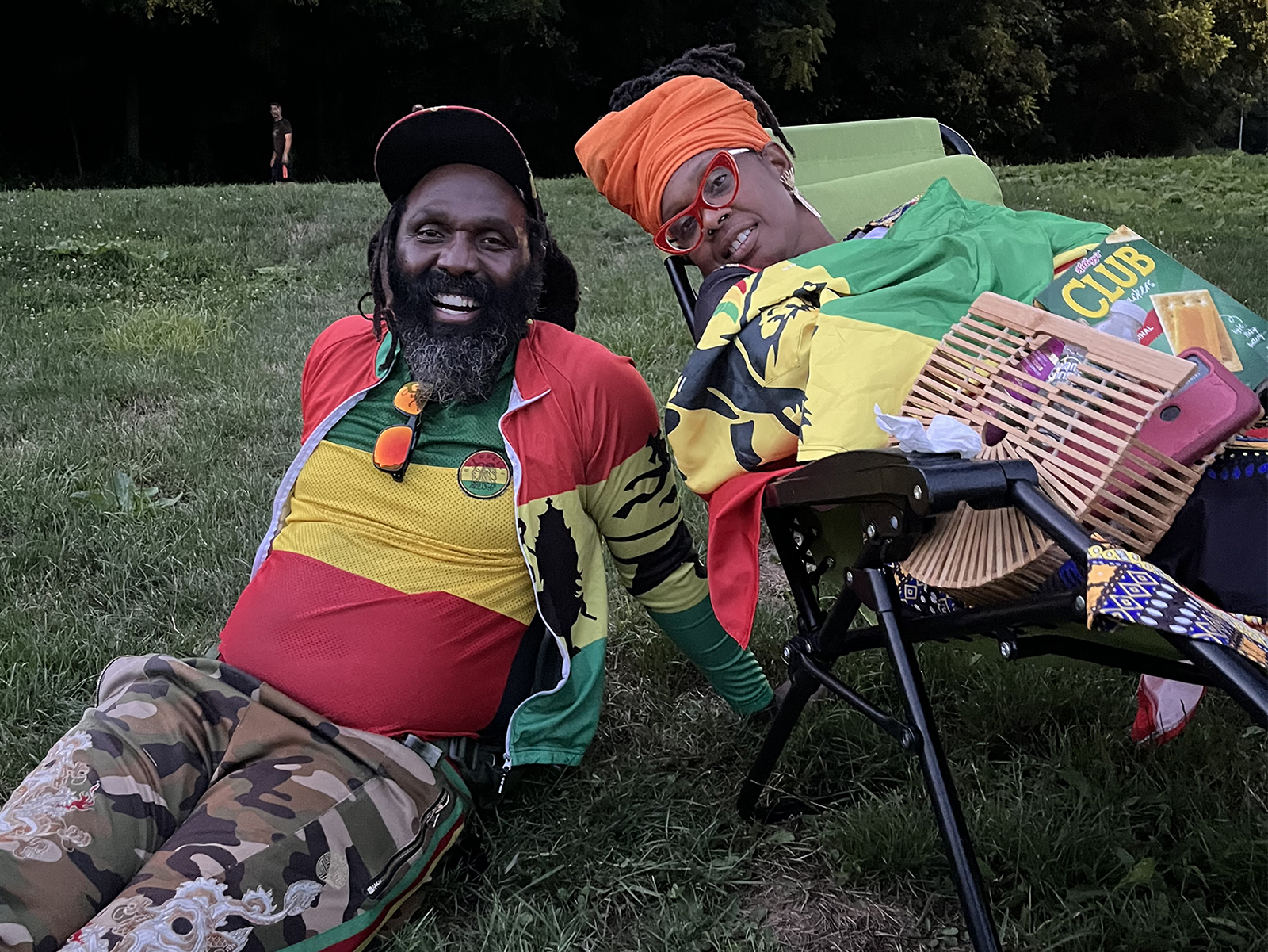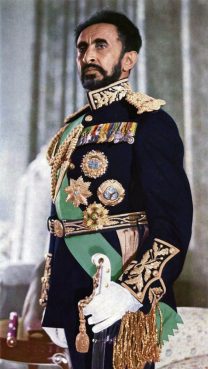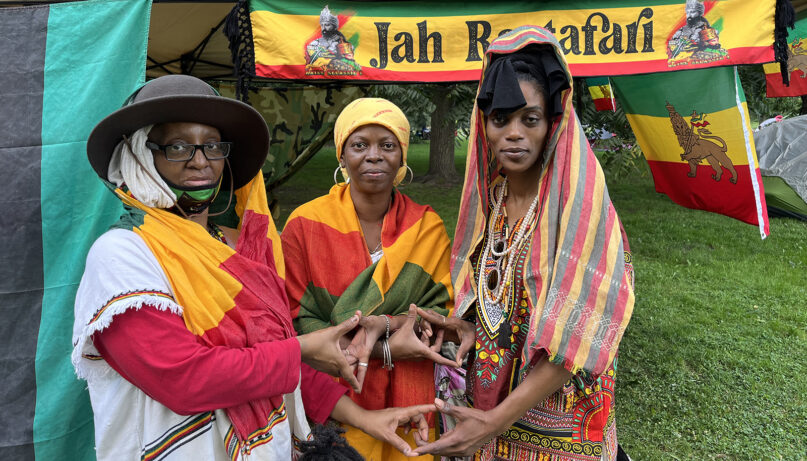NEW YORK (RNS) — After the sun set over the Nethermead, a sprawling lawn in Brooklyn’s Prospect Park, on Saturday (July 22), elders of the Nyabinghi Rastafari Order approached a tabernacle, a meter-high fire pit made of wood. As priests read psalms and prayed to the sound of drums, the elders lit a ritual fire that would continue to burn for three days.
“In the fire, we cast all of our problems, our conflicts, our sins. It’s a purifying fire,” explained Dorrell Howard, known as Bongo Thunder, as he contemplated the tabernacle before the ceremony.
July 23 marks the 131st anniversary of the birth of Ethiopian Emperor Haile Selassie, whom the Rasta faith considers the incarnation of God. Celebrations of Selassie’s birthday differ from one Rasta order to another, but for the nearly 1 million Rastas worldwide, it is an occasion to gather the community and talk about Selassie’s life and accomplishments.
Bongo Thunder attended the ceremony, as he does most years, with his son, now 15. This year, his fiancée also attended. Bongo Thunder, 46, grew up in a Pentecostal church and discovered Rastafari 21 years ago through a Grenadian Rasta friend. The faith’s celebration of Blackness struck him. For him, it’s not a religion; it’s a lifestyle.
“I embrace it because of their love of Black unity and Black culture,” he said.

Dorrell Howard, known as Bongo Thunder, and his fiancée, Spirituality, at Prospect Park in Brooklyn, New York, Saturday, July 22, 2023. RNS photo by Fiona André
Yet from how he talks to how he dresses and eats, Rastafari permeates every corner of his life, he explained. It has also impacted how he views himself. “I carry myself like I am a government official. It gave me pride, a lot of pride,” he said.
Spirituality, his fiancée, came to show her support and learn more about Rastafari. “All of this is new to me,” she said while sitting on a folding chair as she watched the elders set the tabernacle on fire.
Bongo Thunder explained that the ceremony is about transmitting the Rastafari traditions and practices to the younger generations.
Rastafari emerged in the 1930s in Jamaica after Selassie’s coronation on November 2, 1930. For Rastas, it is seen as the realization of Jamaican political activist Marcus Garvey’s prophecy in the 1920s: “Look to Africa when a Black king shall be crowned, for the day of deliverance is near.”
Born in Ethiopia in 1892 as Täfäri Mäkonnän (“Ras” is a noble title he took later), Selassie traced his lineage back to the first emperor of Ethiopia, Menelik I, who is said to be a descendent of King Solomon and the Queen of Sheba, explained Charles A. Price, a Rastafari scholar at Temple University, who is a Rasta. When he became emperor, Ras Täfäri, himself a Christian, styled himself Haile Selassie, a title that translates to “the Mighty of the Trinity.”

Ethiopian Emperor Haile Selassie I, in 1970, is regarded by Rastafarians as the God of the Black race. Photo courtesy Creative Commons
Selassie ruled over Ethiopia for more than 30 years, a reign marked by Ethiopia’s modernization and admission into the League of Nations. He also led the Ethiopian resistance against Mussolini’s fascist Italy in 1935 before being forced into exile and returning to power in 1941. For many Rastas, his rule embodies Africa’s glorious days.
His first visit to Jamaica in April 1966 drew crowds of thousands to Kingston’s airport.
For members of the Jamaican elites, it was an occasion for the emperor to prove Rastas they were wrong, said Price.
Selassie never formally denied being God, fueling speculations over his divine lineage. “It’s a tricky one because it depends on who you ask. Different people interpret things differently,” said David Aarons, an ethnomusicologist at the University of North Carolina Greensboro who studied Rastas who repatriated to Ethiopia.
For Ethiopians, the Rasta cult of Selassie is still hard to understand. In some minority communities, such as the Oromo, he is even considered an oppressor, explained Aarons.
Nicole Morgan, known as Queen Iniki, has no doubt that Selassie is God. She came to Prospect Park with friends — her sisters as she called them — Althea Parkinson and Patricia Ervin on Saturday. On Sunday, during the afternoon, they sat together under their green canopy tent where they burned sage while waiting for the evening’s ceremony. They decorated the tent with the Ethiopian Lion of Judah and red-green-black Pan-African flags.
Growing up in the 1970s in Jamaica hearing about the emperor’s visit, Morgan said, she became interested in Rastafari, particularly its reading of the Bible as, in part, a celebration of Blackness, a notion she hadn’t been taught in the Pentecostal churches of her youth. “Looking at a white Jesus in church while growing up, I felt robbed,” she said.
Parkinson, known as Empress Althea, was born in Guyana and arrived in New York City 40 years ago. She became a Rasta when she was a teen; for her, it is more than a religion.
“It’s a philosophy; it’s about fighting for our freedom, for our rights, as a community,” she said.
She was also drawn by Rastafari’s views on ecology and noted that Rastas are taught to take good care of nature and encourage a minimalist lifestyle.
Like her friends, she chose her title: empress, because she’s said to be very loving and imperious. They planned to stay for three days together to watch the cleansing fire.
“It happens once a year, and he is our majesty!” said Althea.





